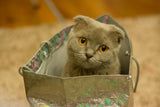Cats are fussy about their food, and you may give your cat human food as a treat. However, there are a number of human foods that a cat shouldn’t eat.
It may be tempting to give your cat a piece of chocolate, or she may sample an unattended piece left behind. Be careful! Chocolate is dangerous to cats. It can cause vomiting and diarrhoea, abnormal heart rhythm, high temperature and even seizures. The methylxanthines found in the cocoa seed can also cause excessive thirst and frequent urination.
Even a small amount of alcohol can harm your cat and in some cases it can be fatal. The alcohol causes vomiting, diarrhoea, breathing problems, tremors, and disorientation.
Your cat should never eat raw dough. It contains yeast which creates alcohol in the stomach, which in turn can cause the stomach to swell. This can cause the stomach to twist, which can be life-threatening.
Keep your cat away from onions and garlic, as well as related items like shallots, scallions and chives. These foods are dangerous, particularly in concentrated forms, because they can harm the cat’s red blood cells and cause anaemia.
Raw eggs are a strict no as they can lead to salmonella or E. Coli. Some of the symptoms are lethargy, vomiting and diarrhoea. It can also cause the cat coat and skin problems.
Caffeinated beverages contain the same methylxanthines found in chocolates, and shouldn’t be given to your cat. It includes energy drinks that contain caffeine.
As a rule, cats are seen as milk drinkers. However, cats have problems digesting the lactose in milk and dairy products. Although kittens drink their mother’s milk, they can have digestive problems like upset stomach when they consume dairy products like milk and cheese later on.
You should keep grapes and raisins away from your cat as these foods can lead to kidney failure. It’s not clear why, but even a small amount can cause abdominal pain, vomiting, decreased urination and lethargy within 24 hours.
Xylitol is found in sweets, baked goods, gum, toothpaste and mouthwash. It’s a sweetener and the insulin it releases in the cat’s bloodstream can lead to dangerous levels of blood sugar. This in turn can cause vomiting, loss of coordination and even result in liver failure.
Cats are curious creatures and like to investigate – so keep dangerous food stuffs out of your cat’s reach. Also check the labels of any processed food you may want to give your cat. Instead, give her a special cat treat.




